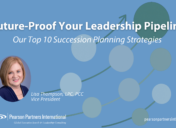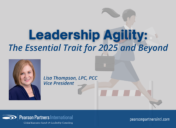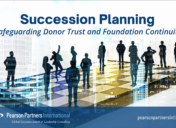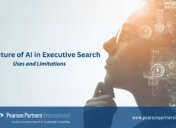HR Roundtable: Immigration in Transition
Featuring Vishal Chander, Immigration Attorney, Gardere Wynne Sewell LLP
Many changes and uncertainties face human resources executives regarding immigration issues. The previous administration issued rules modernizing, improving and clarifying visa programs, while the current administration, still in its infancy, brings unknowns for the future of immigration policy.
In our February 2017 Pearson Partners HR Roundtable (a bimonthly series for senior corporate human resources executives in the North Texas area), Vishal Chander, who leads the Immigration Law practice at Gardere Wynne Sewell LLP, outlined various immigration issues important for HR executives during this time of transition. The presentation took place at the new Dallas facilities of Gardere, located in the McKinney & Olive building in uptown Dallas.
Mr. Chander first discussed some of the final immigration regulations implemented towards the end of the Obama administration that significantly impacted employment-based immigration. Chief among those regulations was the Final Employment Based rule, which implemented a few important changes:
- Automatic EAD Extension: Certain employment authorization document (EAD) renewal applications result in an automatic 180-day extension of employment authorization to prevent gaps in employment. The new rule also allows EAD renewal applications to be filed 180 days prior to the expiration of the EAD. The regulations provide guidance on how to complete the I-9 form for the automatic extension.
- 60-Day Grace Periods: USCIS has codified an official 60-day grace period allowing individuals in the E-1, E-2, E-3, H-1B, H-1B1, L-1, O-1 or TN classifications greater job portability. The grace period will allow high-skilled workers whose employment ceases prior to the end of the petition validity period to pursue new employment in the same classification.
- 10-Day Grace Periods: USCIS has expanded the 10-day initial grace period prior to the start of authorized status and at the end of validity to E-1, E-2, E-3, L-1, and TN classifications. This grace period was previously only available to H-1B holders.
- Compelling Circumstances EAD: The regulations also created a compelling circumstances EAD. This EAD was created to assist nonimmigrant workers and their spouses with long-pending permanent resident applications. Compelling circumstances include serious illness or disability, employer dispute or retaliation, significant disruptions to employment and other substantial harm to the applicant.
- I-485 Supplement J: USCIS implemented the use of I-485 Supplement J for seeking portability under the AC21 and any other times when adjustment is not sought concurrently with a petition for alien workers.
Mr. Chander then discussed the upcoming H-1B filing season, starting with the principal option to continue employment of foreign students when the H-1B is not selected for processing—i.e., the 24-month STEM OPT extension. This extension allows graduates of STEM degree programs from United States universities to seek a 24-month extension of the Optional Practical Training (OPT) period. The extension requires the employer to be an E-Verify participant and to assist the employee with completion of the I-983 training plan.
Mr. Chander also discussed the Immigrant Entrepreneur Rule, which provides deferred action for certain foreign nationals working with startup entities. The rule requires a significant ownership interest and a significant capital investment in the startup entity. Mr. Chander also reviewed changes to the EB-5 Immigrant Entrepreneur program, including proposed increases to the minimum investments and Regional Center Program.
Closing the discussion, Mr. Chander talked about the changes being proposed by the Trump administration, including the impacts on travel, families of undocumented employees and travel bans.
If you would like to see more detail in the complete presentation slideshow, please email .
Save the date for our April 11 session, Employee Advocacy: The Secret Weapon of Your Employment Brand Program, featuring Carrie Corbin, American Airlines Head of Talent Programs: Employer Brand & Diversity Recruiting. If you are a senior-level corporate HR executive and would like to attend, please email .
About Vishal Chander
Vishal Chander leads the Immigration & Nationality practice of Gardere Wynne Sewell LLP, where he focuses on the needs of multinational companies, foreign investors, persons of extraordinary ability and other priority workers. Mr. Chander advises companies and individuals on immigration issues related to foreign investment and expansion of operations into the United States. He is experienced in all areas of immigration practice including employment-based immigration matters, foreign investment, complex family-based immigration, and removal, naturalization and humanitarian matters. Mr. Chander regularly advises private equity firms and real estate and restaurant developers regarding EB-5 financing. His clientele includes Fortune 500 companies, technology startups, the oil & gas industry, the maritime industry, athletes and entertainers, health care providers and educational and research institutions.
Related Posts
- ← A Perfect Match for Match Group
- Global Reach, North American Strength – The Power of IIC Partners →














